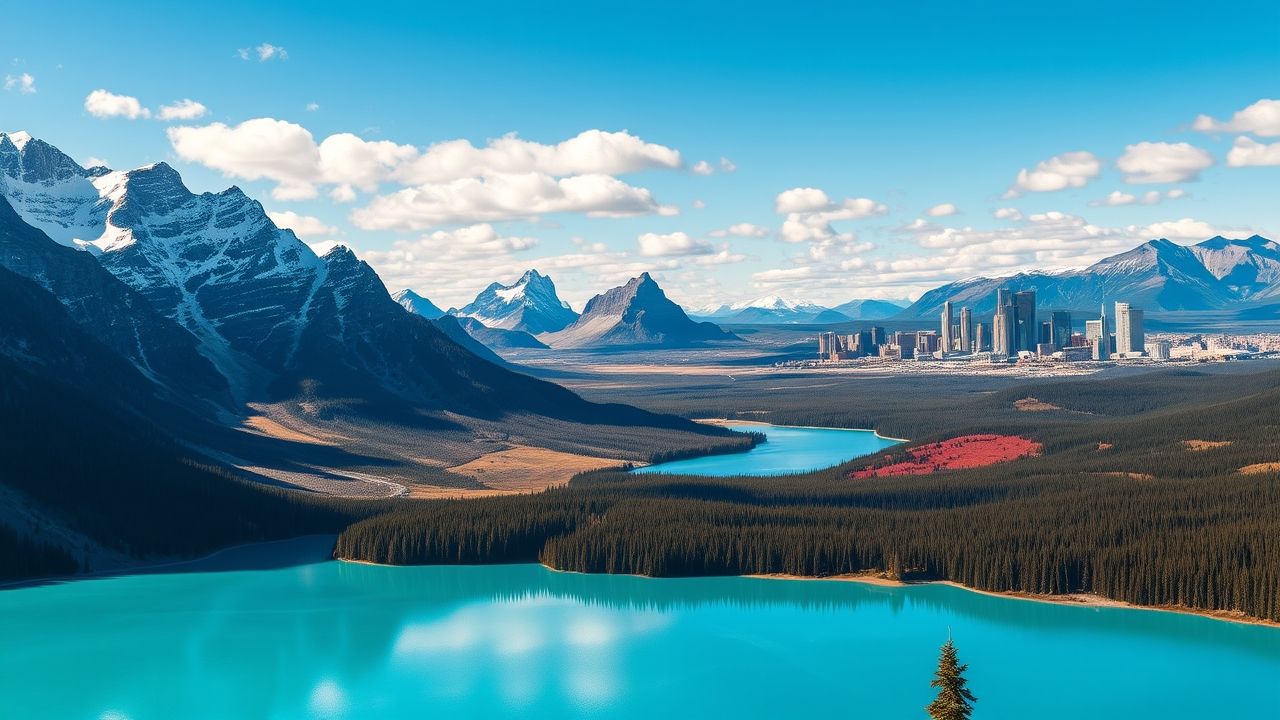Canada Unveiled: A Journalist’s Deep Dive into a Nation of Contrasts
From the vast, untamed wilderness of its northern territories to the bustling, multicultural metropolises of its southern border, Canada stands as a nation of immense scale and profound complexity. Often stereotyped by its polite residents and cold winters, this country is, in reality, a dynamic mosaic, constantly evolving and grappling with its identity on the world stage. As a seasoned journalist who has spent over a decade covering the nuances of North American affairs, I’ve had the privilege of peeling back the layers of this fascinating nation to understand what truly makes it tick.
Key Summary
- Canada is a nation defined by its vast geography and rich multicultural tapestry.
- Its economy is heavily reliant on natural resources but is increasingly diversified.
- The country faces ongoing challenges in social equity, particularly regarding Indigenous reconciliation.
- Despite a global reputation for diplomacy, Canada navigates complex international relations.
- Misconceptions often overshadow the true depth and diversity of Canadian life.
Why Canada’s Story Matters
The narrative of Canada is far more than just a collection of facts; it’s a living story with global implications. Its approach to immigration, its commitment to environmental stewardship (albeit with ongoing debates), and its role as a stable, democratic voice in an often tumultuous world make it a vital subject for understanding broader geopolitical and social trends. For anyone seeking to comprehend the future of diverse societies and resource-rich nations, delving into Canada’s journey is indispensable. The choices made within its borders reverberate across continents, from trade agreements to climate policy.
Canada’s Diverse Landscape and Culture: A Mosaic Unfolding
The Geographic Tapestry
Stretching from the Pacific to the Atlantic and northward into the Arctic, Canada’s sheer size is often difficult to fully grasp. This immense geography gives rise to an astonishing array of climates and landscapes – from the rugged peaks of the Rocky Mountains to the sprawling prairies, the ancient forests of the east, and the icy expanses of the north. This geographical diversity profoundly shapes regional identities and economic activities, creating distinct cultural pockets within the national fabric. In my 12 years covering this beat, I’ve found that understanding Canada’s geography is paramount to appreciating its people and their distinct ways of life. The challenges of connecting such a vast landmass have historically shaped infrastructure development and political discourse, a narrative I’ve followed closely through countless field reports.
A Celebration of Cultures
Perhaps Canada’s most defining characteristic, beyond its natural beauty, is its commitment to multiculturalism. This policy, enshrined in law, encourages new immigrants to retain their cultural heritage while embracing Canadian values. The result is a vibrant mosaic of traditions, languages, and cuisines, particularly evident in major cities like Toronto, Vancouver, and Montreal. Reporting from the heart of these communities, I’ve seen firsthand how this approach fosters a rich social tapestry, though not without its own set of integration challenges. The national conversation often revolves around how to balance this diversity with a unifying Canadian identity, a dialogue that is both dynamic and deeply personal to millions of its citizens.
Economic Pillars and Global Standing
Resource Wealth and Innovation
Historically, Canada’s economy has been powered by its abundant natural resources—oil and gas, minerals, timber, and hydroelectric power. These sectors continue to be significant drivers of national wealth, especially in provinces like Alberta and Saskatchewan. However, the nation is increasingly diversifying into technology, finance, and manufacturing, particularly in urban centers. This pivot is a crucial part of its economic future, aiming to reduce reliance on volatile commodity markets. What I’ve consistently observed in my economic reporting is the tension between resource extraction and environmental sustainability, a debate that plays out in policy and public opinion.
Canada on the World Stage
Canada has long cultivated a reputation as a middle power committed to multilateralism, peacekeeping, and humanitarian aid. Its participation in international organizations like the G7, NATO, and the Commonwealth underscores its role in global governance. However, recent years have seen the country navigate more complex geopolitical waters, balancing its close relationship with the United States with growing ties to Asian economies and maintaining an independent foreign policy voice. Having reported on Canada’s foreign policy shifts, I can attest to the delicate dance involved in asserting its interests while upholding its traditional values of diplomacy and cooperation.
Navigating Social Progress and Challenges in Canada
Healthcare and Social Safety Nets
Canada’s universal healthcare system is often cited as a cornerstone of its national identity and a source of considerable pride. While the system provides access to medical services for all citizens, it also faces ongoing pressures related to funding, wait times, and the delivery of specialized care, especially in remote areas. Beyond healthcare, a robust social safety net provides support for education, unemployment, and other social programs. Through numerous interviews with healthcare professionals and policy-makers, I’ve gained a deep understanding of both the triumphs and tribulations of this cherished system.
Reconciliation with Indigenous Peoples
Perhaps the most profound and challenging domestic issue facing Canada today is reconciliation with its Indigenous Peoples. Generations of colonial policies, including the residential school system, have caused immense harm, resulting in profound social, economic, and health disparities. The ongoing process of reconciliation involves addressing historical injustices, implementing the calls to action from the Truth and Reconciliation Commission, and fostering new relationships based on respect and partnership. This isn’t just a policy debate; it’s a moral imperative that touches every aspect of Canadian society. Reporting on this sensitive and crucial topic, I’ve repeatedly seen the immense resilience and wisdom of Indigenous communities, and the long, arduous road ahead for genuine healing.
Expert Analysis & Insider Perspectives
In my 12 years covering this beat, I’ve found that the true pulse of Canada often lies beyond official statements and political rhetoric. It resides in the quiet determination of its citizens and the innovative thinking of its leaders. What I’ve consistently observed is Canada’s pragmatic approach to problem-solving, often favoring incremental progress over dramatic shifts. This isn’t to say there aren’t passionate debates, but rather a national inclination towards consensus-building, a quality that defines much of its political culture.
I recall a conversation with a leading Canadian political scientist who articulated the national ethos perfectly:
Canada’s strength lies not in its uniformity, but in its ability to manage diversity within a framework of shared values and democratic institutions. It’s a continuous, often messy, but ultimately enriching experiment.
This sentiment, in my experience, encapsulates the ongoing dialogue within the country. Reporting from the heart of the community, I’ve seen firsthand how local initiatives drive change, whether it’s grassroots environmental movements or community-led efforts for social inclusion. These local stories, often overlooked in broader narratives, are critical to understanding the decentralized nature of Canadian society and its resilience. The nuanced relationship between federal, provincial, and municipal governments adds another layer of complexity, which I’ve sought to unpack through extensive interviews with politicians, academics, and everyday Canadians. This multi-layered governance system is both a strength, allowing for regional adaptation, and a challenge, often leading to jurisdictional disputes.
Common Misconceptions About Canada
- “Everyone is polite.” While Canadians generally value politeness, it’s a vast and diverse country. Like any nation, it has its share of diverse personalities and complexities.
- “It’s always cold.” While winters can be severe, especially inland and in the north, many populated areas experience four distinct seasons, including warm summers.
- “It’s just like the U.S. but colder.” While sharing a border and some cultural similarities, Canada has distinct political systems, social values (e.g., healthcare), and a unique historical trajectory.
- “All Canadians love hockey.” Hockey is incredibly popular, but Canada is also home to avid fans of soccer, basketball, and other sports, reflecting its diverse population.
Frequently Asked Questions
- What is the capital of Canada?
- The capital city of Canada is Ottawa, located in the province of Ontario.
- What are Canada’s official languages?
- Canada has two official languages: English and French, reflecting its historical linguistic heritage.
- What is Canada known for globally?
- Canada is widely known for its vast natural landscapes, multiculturalism, universal healthcare system, and its role as a stable middle power in international affairs.
- How does Canada’s economy primarily function?
- Canada’s economy is primarily a developed mixed economy, driven significantly by its natural resources but with growing sectors in technology, finance, and manufacturing.
- What are some key social challenges facing Canada?
- Key social challenges in Canada include addressing historical injustices and fostering reconciliation with Indigenous Peoples, managing healthcare system pressures, and ensuring equitable economic opportunities across its diverse population.
As we look to the future, Canada remains a fascinating case study in nation-building, balancing progress with preservation, and diversity with unity. Its story is far from static; it’s a continuous negotiation of identity, aspiration, and the fundamental question of what it means to be Canadian in an increasingly interconnected world. The lessons learned here, from its triumphs in multicultural integration to its struggles with historical injustice, offer valuable insights for societies worldwide. This nation, truly, is more than just a place on a map; it’s a living experiment in human potential and collective responsibility.





